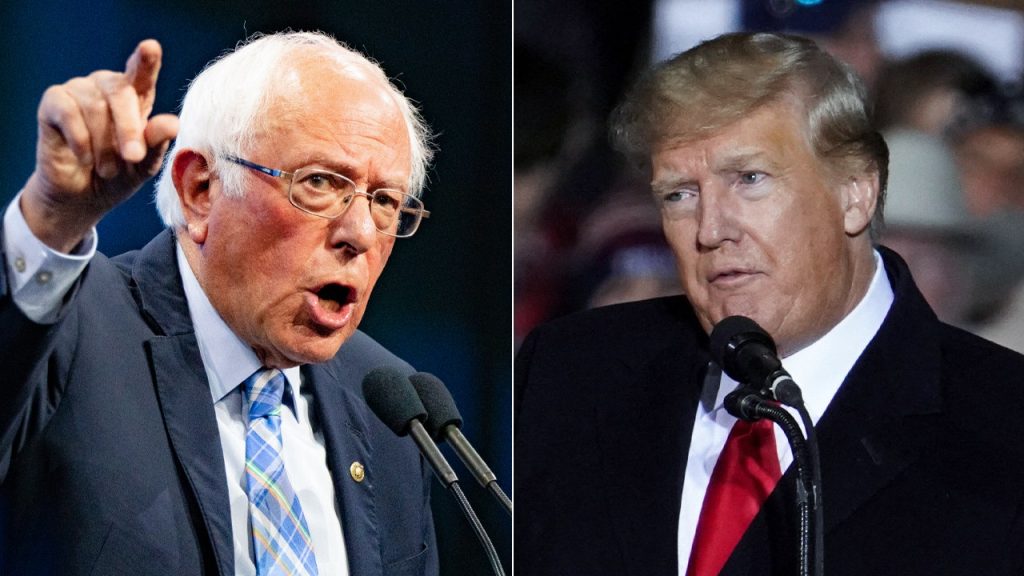In a surprising shift from his previous stance, Senator Bernie Sanders expressed approval of former President Donald Trump‘s measures regarding fentanyl and border security during a recent interview. This affirmation came during a segment on ABC’s “This Week” with Jonathan Karl, highlighting Sanders’ evolving views on immigration reform amidst escalating discussions on U.S. border policies. While Sanders continues to advocate for comprehensive immigration reform, his current position raises questions about the implications for future policies as both parties navigate the complexities of immigration and border control.
| Article Subheadings |
|---|
| 1) A New Perspective on Border Security |
| 2) Historical Context of Sanders’ Immigration Views |
| 3) The Potential Impact of Deportation |
| 4) Criticism of Current Immigration Policies |
| 5) Future Directions for Immigration Reform |
A New Perspective on Border Security
During the television interview, Senator Bernie Sanders acknowledged the necessity of addressing the fentanyl crisis and bolstering border security, adding a note of pragmatism to his viewpoint. He remarked, “I think cracking down on fentanyl, making sure our borders are stronger,” indicating a recognition that drug trafficking and illegal immigration require concerted policy action. Sanders emphasized the importance of a national approach to these issues, suggesting an understanding that drug-related problems cross into broader immigration debates. This statement reflects a nuanced understanding of the complex issues at the U.S.-Mexico border and the interconnectedness of crime and immigration.
Historical Context of Sanders’ Immigration Views
Senator Sanders has a storied history with immigration reform, including positions he advocated during his 2020 presidential campaign. At that time, he proposed significant changes, arguing for the dismantling of U.S. Immigration and Customs Enforcement (ICE) and halting deportations. His blueprint included comprehensive immigration reform, prohibition of the border wall, and the decriminalization of illegal immigration. Elements of this previous platform now appear to clash with his current comments, raising questions about the evolution of his views. The shift may signify an effort to appeal to a broader range of voters concerned about both immigration and national security in a post-Trump political landscape.
The Potential Impact of Deportation
In the same interview, Sanders voiced strong opposition to mass deportation, warning that removing “20 million people who are in this country who are undocumented would destroy the entire country.” His robust argument points to the agricultural industry, asserting, “Trump’s billionaire friends are not going to pick the crops in California that feed us.” This perspective highlights the dependency of various sectors on undocumented labor and underscores a deeper economic rationale underpinning the immigration debate in the U.S. Sanders advocates for a mixed approach involving guest worker programs, reflecting a potential collaboration between policy reform and economic needs.
Criticism of Current Immigration Policies
Addressing the evolution of immigration policies under the Biden administration, Karl prompted Sanders to reflect on the situation, to which Sanders conceded that the current administration should have done better. His acknowledgment resonates with growing dissatisfaction from various sectors regarding the administration’s handling of border security and immigration challenges. The senator’s remarks suggest a call for unity among progressive leaders and advocates for reform, driving home the point that while differing in methods, there is a shared responsibility in addressing complex immigration issues effectively.
Future Directions for Immigration Reform
Looking forward, Sanders seems to be positioning himself in favor of broad immigration reform that reconciles security with a humanistic approach to undocumented audiences. His emphasis on comprehensive reform may signal an intent to work across party lines to create sustainable policies focused on compassion, economic stability, and national security. The combination of strong border security paired with pathways to legal status for undocumented immigrants could provide a balanced solution for ongoing tensions surrounding the immigration debate. The senator’s continuing influence in these discussions will be critical as he engages in further public speaking tours and rallies across the country alongside other progressive leaders.
| No. | Key Points |
|---|---|
| 1 | Senator Bernie Sanders endorsed aspects of former President Donald Trump‘s approaches to drug trafficking and border security. |
| 2 | Sanders is historically known for advocating progressive and humanitarian immigration policies. |
| 3 | The senator warned against mass deportations, relating it to the agricultural sector’s reliance on undocumented labor. |
| 4 | Sanders critiqued the Biden administration’s handling of immigration, emphasizing the need for improved policies. |
| 5 | His future vision for immigration includes a blend of border control and comprehensive paths to legal status. |
Summary
Senator Bernie Sanders‘ recent statements highlight a significant shift in his approach to border security and immigration reform. By acknowledging the complexities of the current political climate and offering a balance between security and humanitarian considerations, Sanders positions himself as a leader willing to adapt his views for broader appeal and effective policymaking. As he continues his advocacy and outreach across the nation, the implications of his comments may shape future debates on immigration and exit from the polarizing rhetoric that has dominated recent years.
Frequently Asked Questions
Question: What are the main themes of Senator Sanders’ current immigration stance?
Senator Bernie Sanders emphasizes a combination of strong border security and comprehensive immigrant reform, advocating for pathways to legal status for those currently undocumented while also addressing drug trafficking issues.
Question: How does Sanders’ view compare to his previous stance in 2020?
During the 2020 presidential campaign, Sanders supported the dismantling of ICE and halting deportations, whereas his current comments seem to acknowledge the necessity of addressing border security and the fentanyl crisis, reflecting a departure from his prior positions.
Question: What economic concerns are raised in the context of immigration?
Senator Sanders highlighted the reliance of industries like agriculture on undocumented labor, arguing that mass deportation could significantly disrupt the economy and food supply chain.


